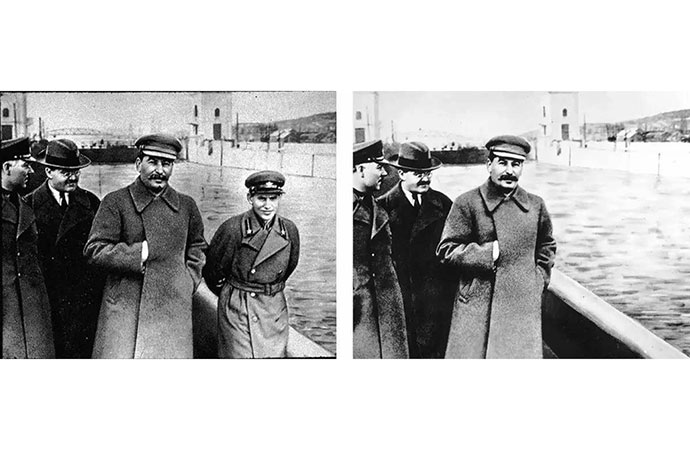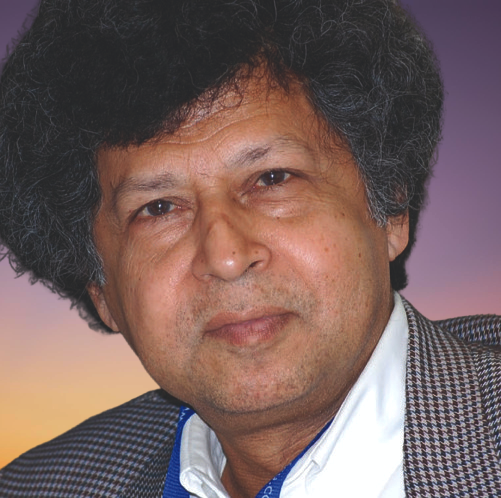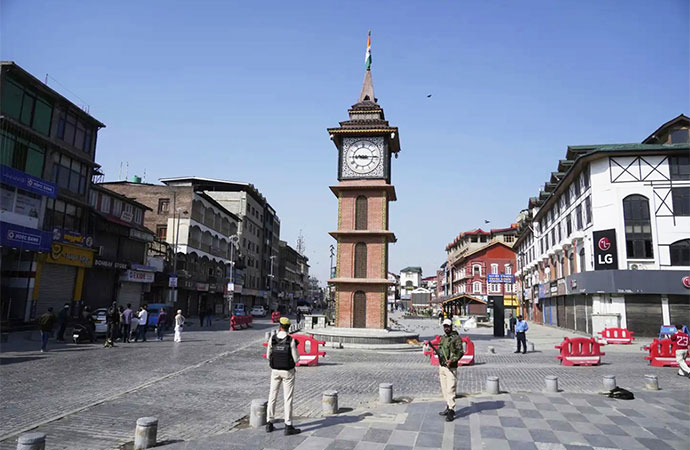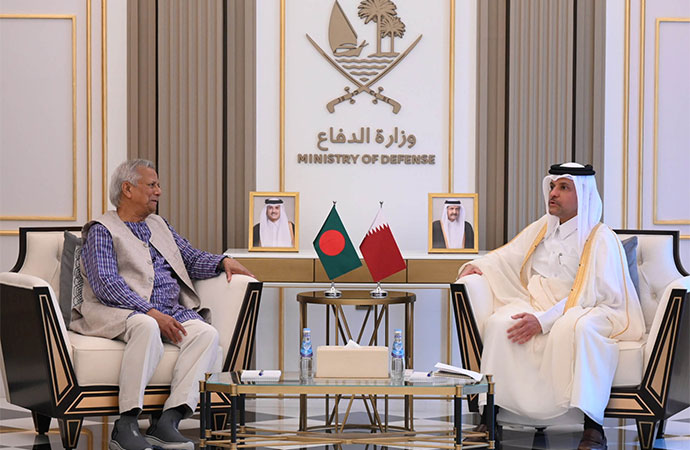Column

The Commissar disappears
One of the unintended consequences of last year's July-August uprising in Bangladesh has been a growing clamour to revisit-and in some cases, rewrite-the nation's history, including the story of 1971. But what is the purpose of such a revision? To clarify the past-or erase it?
Consider the photograph on the left: taken around 1938, it features four men-an unnamed soldier, General Kliment Voroshilov, Joseph Stalin, and, on the far left, Nikolai Yezhov, head of the Soviet secret police. In a later version of the same photo, Yezhov is gone. After his execution in 1940 on charges of espionage, Soviet authorities quite literally erased him from history-removing his image from books, archives, and even photographs.
History, however, is not so easily silenced. It flows like a river-delayed, diverted, but never stopped. You can dam it, reroute it, try to bury its course. But like water seeking its natural path, truth has a way of resurfacing. Take the photo of Nikolai Yezhov: once erased from Soviet records, his absence became the loudest presence-an emblem of erasure itself. Today, the doctored image circulates widely, not as propaganda but as proof of manipulation. In trying to delete him, Stalin's regime made him immortal. So it is with history: the harder you try to suppress it, the more insistently it returns.
In Bangladesh, that course is being reshaped by a new generation. In the wake of the youth-led uprising of July 2024, a bold current of historical inquiry has emerged. This is not a movement led by academic historians, but by students determined to reconstruct-or reconsider-the story of their nation.
Some among them are driven by ideology, others by a genuine desire to see the past with clearer eyes. Rewriting history, after all, is not a novelty. It often trails the shadow of political change. In 13th century BCE Egypt, Pharaoh Akhenaten erased centuries of religious tradition to impose monotheism, placing himself at its center. After his death, Tutankhamun reversed course-chiseling his predecessor's name off monuments to reassert the old order.
Modern history provides starker examples. Stalin's Soviet Union mastered the art of historical manipulation long before Photoshop: encyclopedias, archives, and photographs were carefully scrubbed of purged figures like Leon Trotsky. Ink and erasers became tools of ideological purity.
Pakistan, too, rewrote its own story after 1971. In a bid to conceal the shame of defeat and genocide in East Pakistan, its schoolbooks were repeatedly edited to construct a triumphalist Islamic narrative. Historian Ayesha Jalal famously described this as the state's effort to pass off "official imagination" as historical fact. Power and religious orthodoxy merged to create a manufactured identity. India, under Narendra Modi, is now walking a similar path.
And, as unbelievable as it may seem, the United States is not exempt. The brutal legacy of slavery is being systematically erased from school curricula, websites, and monuments. Former President Donald Trump, along with a cadre of white elites, has pushed to portray America as inherently "great"-a narrative that demands four centuries of racial violence be conveniently forgotten. As The New York Times noted, the White House is framing the past by erasing parts of It.
In Bangladesh, the picture is more complex. What's unfolding is not a state-sponsored campaign but a grassroots one-led by the very students who ignited the 2024 movement. They insist they are not trying to erase history but to recover it. They do not deny the importance of the 1971 Liberation War; rather, they are posing difficult, overdue questions about its meaning-and what followed.
There is, as yet, no fully developed theoretical framework. But one thing is clear: these students have openly criticized the post-independence order, especially the role of Sheikh Mujibur Rahman and the Awami League. A student adviser was seen removing Mujib's photo from his office. His historic home at Dhanmondi 32 was vandalized. Statues of both Mujib and Prime Minister Sheikh Hasina have been toppled.
To them, 1971 brought sovereignty, but not emancipation. It gave Bangladesh a flag, but not justice. Student leader Mahfuz Alam articulated this sentiment in a widely shared Facebook post:
"Sheikh Mujib and his daughter (another Sheikh) have faced public fury for their fascist rule. The difference is, Mujib was once a beloved leader of East Bengal, a popularity Hasina never had. People followed his leadership against Pakistani oppression-but after 1971, he became a tyrant. His support for 'Mujibism' left Bangladesh crippled and divided. So when he died in 1975, the public did not mourn him."
These young chroniclers have described the 2024 uprising as a second liberation. In their view, the Awami League's one-party rule buried unresolved questions of identity and purpose. In an interview with daily Prothom Alo, Mahfuz Alam argued that the 1972 constitution imposed a narrow, state-defined secularism that excluded the lived experiences of the majority Muslim population. That, he said, created the conditions for politicized Islam to return.
"The critical questions of 1971 were buried under the monolith of 1972. That year's forced consensus left no space to include the broader Bengali Muslim society. Neither farmers nor workers found a place in the new state."
Even more provocatively, Alam argues that the Liberation War was not only a struggle against Pakistan but also against Indian dominance. He calls for a deeper reckoning with why the Bengali Muslim masses rose up-and what they thought they were fighting for.
Unsurprisingly, these revisionist views have stirred backlash. The BNP, seeking to cast itself as the new custodian of Liberation War values, has condemned the student movement. One BNP leader accused them of diminishing 1971 to glorify 2024-a distortion of history in its own right.
But as the Haitian anthropologist Michel-Rolph Trouillot observed in Silencing the Past, the past matters to the powerful not for what it was, but for how it can justify the present. "The past is only the past because the present exists," he wrote. That is why today's power players in Bangladesh-whether a single political party or a coalition-are battling to control yesterday's story, to legitimize today's authority.
And yet, this national reckoning is neither surprising nor unwelcome. Sometimes, history must be rewritten-not to deceive, but to correct. Colonial narratives crafted by British or French rulers weren't just wrong-they were insults. Revising them isn't just valid; it's necessary.
Can the same be said of Bangladesh's Liberation War?
Certainly, debate around 1971 is not new. Questions of who declared independence, the roles of non-Awami figures, the timeline of the war-all remain unresolved. The exclusion of Maulana Bhashani from the national narrative is still contested. So too is the role of religion in the war. The movement of 2024 has created new space to revisit these questions.
There is no reason to fear this.
The new generation is not burying history-they're unburying it. They're asking the hard questions, not to destroy the past but to illuminate it. Whether now or in the future, the truth will surface.And when it does, what is there to be afraid of?

























Leave a Comment
Recent Posts
The forensic clean up of the f ...
Much of the coverage centring the surge in Non Performing Loans (NPLs) ...
Hong Kong’s deadliest fire in ...
Hong Kong’s deadliest fire in decades left at least 44 people de ...
False document submission hurts genuine students’ ch ..
The Missing Ingredients for Peace in Palestine
Songs of Hyacinth Boats & Hands: Reading Conversatio ..
Executive Editor Julie Pace on why AP is standing fo ..